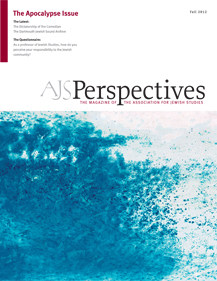Dear Colleagues,
What is the apocalypse? When is it coming?
Even though fears of a 2012 apocalypse predicted by the Maya rest on a misinterpretation, global events point to the erosion of venerable institutions, the exhaustion of familiar political and economic systems, and the depletion of vital resources. With so many things reaching their terminal point, scholars from across disciplines find themselves engaged in speculation about the end. Amidst this flurry and variety of apocalyptic discourse, we present cutting-edge articles that analyze and historicize Jewish thinking about the end times.
Visions of the apocalypse express a yearning for a redemptive return to a moment of primal origin. Mircea Eliade famously described ritual as a means of departure from the depleting effects of history and a return to a mythic state of unity. Scholars have linked Eliade's critique of history and valorizing of essential identities with his fascist leanings and cast doubt on the motives for dismissing history in the name of purity. In its pursuit of redemption and purity, apocalypticism subjects history to a more violent fate. It perceives a corruption so thorough as to require the obliteration of the sociopolitical order. Since the corruption is even imagined as infecting nature, the physical world itself needs restoration. Where ritual, according to Eliade, seeks to exit history, apocalyptic thought wants to stop history in its tracks.
Ironically, the apocalyptic pursuit of purity takes the form of wild and violent images. Apocalyptic visions subject enemies to grand cruelties and enumerate excessive cataclysm. Revenge, more than redemption, seems to be the pleasure conferred by the apocalypse. In its various permutations, apocalyptic discourse functions as political hyperbole, flagging ubiquitous corruption and dramatizing oppositional positions. It wavers between fervent longing for society to come crashing down and anxiety that the failure to change the course of human history will result in widespread suffering and punishment.
Matti Bunzl
University of Illinois at Urbana-Champaign
Rachel Havrelock
University of Illinois at Chicago

